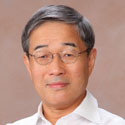Advisory Board and Editors Neuroscience

Albert HC Wong
Albert H.C. Wong is a neuroscientist and psychiatrist at the Centre for Addiction and Mental Health, and a Professor at the University of Toronto. He attended medical school at the University of Toronto, where he also completed specialty training in psychiatry and a PhD in neurobiology. Dr. Wong’s lab uses animal models and clinical studies to investigate genetic, epigenetic and developmental mechanisms of psychiatric disease. His areas of clinical expertise are in schizophrenia and brain stimulation.
Jang-Yen J.Y. Wu
Senior Schmidt Fellow and Distinguished Professor, Department of Biomedical Science of Charles E. Schmidt College of Medicine, Florida Atlantic University. Recipient of Award in Science and Technology of Taiwanese-American Foundation in 2005. Associate Editor of Journal of Biomedical Science.

Hao Wu
Hao Wu is a patent scientist in an oncology-focused biotechnology company, Exelixis, Inc. She obtained her Ph.D. in molecular biology from Rowan University (previously known as the University of Medicine and Dentistry of New Jersey (UMDNJ) – Stratford Campus). With hands-on knowledge in various aspects of biology, including molecular biology, cell biology, biochemistry, immunology, neuroscience, oncology, Hao has worked on inventions spanning a broad range of technologies, for example, biologics, antibodies, biomarkers, diagnostics, cell therapy, gene therapy, and sequencing.

Sergiy Yakovenko
Dr. Yakovenko is an associate professor in Rockefeller Neuroscience Institute in West Virginia University, where his laboratory develops interdisciplinary expertise in neurophysiology and computational neuroscience to address questions in system motor control. The research program is focused on developing reliable neural interfaces capable of controlling dexterous prosthetic devices.

Yuki Yamada
He is an associate professor of Faculty of Arts and Science, Kyushu University. He finished his PhD in 2008 where he carried out research looking at spatial localization. He is now expanding his research interests to emotion, personality, and consciousness as well as spatial and time perceptions. Awarded The Young Scientists' Award by the Japanese Ministry of Education, Culture, Sports, Science and Technology in 2021.
He serves as a senior editor of Journal of Illusion and as a managing board member of PCI Registered Reports. He is also an editorial board member of Scientific Reports, Collabra: Psychology, Japanese Psychological Research, Trends in Scholarly Publishing, and Cognitive Studies.

Tadashi Yamamoto
Professor of Cell Signal Unit, Okinawa Institute of Science and Technology Graduate University. Editorial Board: Genes to Cells, Molecular Biology of the Cell, Protein and Cell, Experimental & Molecular Medicine. Awarded 1987, Princess Takamatsu Cancer Research Fund Prize, 1990 Asahi Prize, 2003 NIH Fogarty Scholar-in-Residence. Former director of the Institute of Medical Science, University of Tokyo.

Dong Yan
Dong Yan received his bachelor’s degree in Biology from Nankai University (Tianjin, China) in 2001. Following an interest in neuroscience, he then joined the Institute of Neuroscience (ION), the Chinese Academy of Sciences, as a graduate student. During his graduate training, he discovered the important role of AKT local degradation in the establishment and maintenance of neuronal polarity. As a postdoctoral fellow at the University of California, San Diego, he furthered his study of neural development and disorder in vivo using the genetic model organism C. elegans. Here, he demonstrated the essential role of a conserved MAP kinase pathway, the DLK-1 pathway, in axon regeneration and synapse regulation. Dr. Yan joined the MGM department at Duke University in September 2013. His lab focuses on addressing the molecular mechanisms undying neural circuit formation during development and neurodegeneration in aging.

Myrka Zago
Myrka Zago (PhD) is Professor at the University of Rome Tor Vergata. She is Director of the Center of Space BioMedicine of the University of Rome Tor Vergata. She is Research Director of the Laboratory of Visuomotor Control and Gravitational Physiology at Fondazione Santa Lucia. She is an expert in visuomotor control, gravitational physiology and physiology of locomotion.

Yu-Dong Zhang
From 2010 to 2012, Dr. Yudong (Eugene) Zhang worked at Columbia University as a postdoc. From 2012 to 2013, he worked as an assistant research scientist at Columbia University and New York State Psychiatric Institute. From 2013 to 2017, he is a full professor and doctoral advisor at School of Computer Science and Technology at Nanjing Normal University. He also serves as the academic leader of the“Jiangsu key laboratory of 3D printing equipment and manufacturing”. At present, he is a Professor in Knowledge Discovery and Machine Learning, in Department of Informatics, University of Leicester, United Kingdom. His research interests focus on computer-aided medical diagnosis and biomedical image processing.

Bao-Liang Zhong
Dr. Bao-Liang Zhong is an associate professor in psychiatry, and currently working in Wuhan Mental Health Center. He is also the deputy director of the Research Center for Psychological and Health Sciences, China University of Geosciences. His research interest includes mood disorders and mental health services.

Li Zuo
Fellow of the American College of Sports Medicine (FACSM) at The Ohio State University, College of Medicine.

